

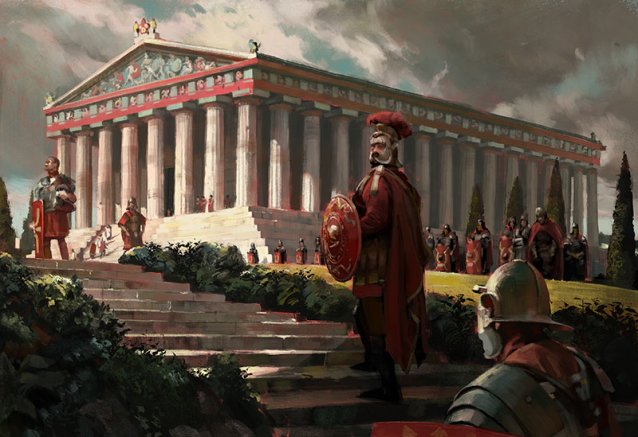
The jump from vanilla Civilization 5 to the Gods and Kings expansion completely changed the way people played. Gods and Kings made siege units available to all players (not just those with iron) to help with the inevitable military campaigns a civilization will eventually encounter. The technology tree followed a more logical progression and further increased the importance of science output. Most notably, the addition of religion added a huge benefit to civilizations willing to dedicate time to constructing faith producing buildings. The expansion not only brought more units to build, religions to found or wonders to construct, the expansion brought absolutely necessary improvements. Civilization 5: Brave New World doesn't drastically change from Gods and Kings, but the addition of the World Congress and greater importance of Culture, will help bitter players - who failed at a military conquest - at least still believe that victory remains achievable.
Right at turn zero you will notice that water tiles and tiles adjacent to rivers no longer provide gold bonuses. To make up for the gold loss, players will establish trade routes via caravans or cargo ships to send and receive gold to neighboring cities. Unlike regular trades, a player can establish a trade route without permission. When you select a city or city-state to trade with, the caravan or cargo ship will provide gold, science and religious influence, with returns in greater amounts. Both players benefit from trade routes, but the player who established the trade will benefit significantly more.
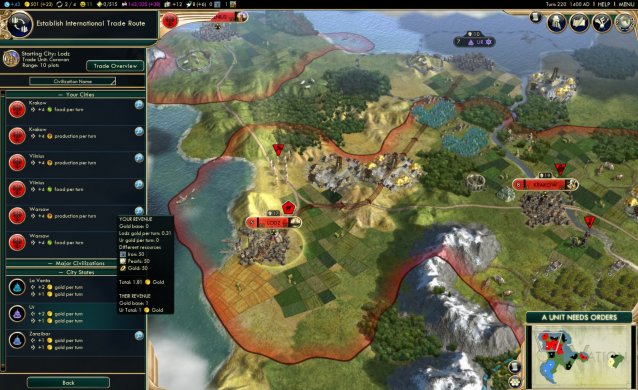
Trade routes ultimately just replace rivers and water tile gold bonuses, but also prevent players from war mongering. You will quickly notice the downward spiral of your city growth if you choose to ignore trade routes or decide to declare war early. Without any buildings or tiles to provide a steady source of gold, military campaigns without the economy to support the funding, will ruin your chances of winning. Once you declare war and find you can sustain a healthy economy without your neighbors, and then you can also establish trade routes between your own cities to send large amounts of food or production.
Near the beginning of the game you will put heavy emphasis on trade routes, but once you start building markets and banks and eventually reach the limit for routes allowed, it quickly becomes a trivial decision process where you will always just pick the trade route that provides the most gold. The role of trade routes proves significant to your economy, but the process of establishing them requires very little risk reward management.
Once your gold reaches comfortable levels, you can begin focusing on your city's Culture and Tourism output. Culture and Tourism represent different types of culture. Culture generation helps you adopt Social Policies while Tourism acts as offensive type of Culture that doesn't tangibly benefit you; it hurts other players. To generate Culture you can construct wonders, buildings or adopt Social Policies to increase your output.
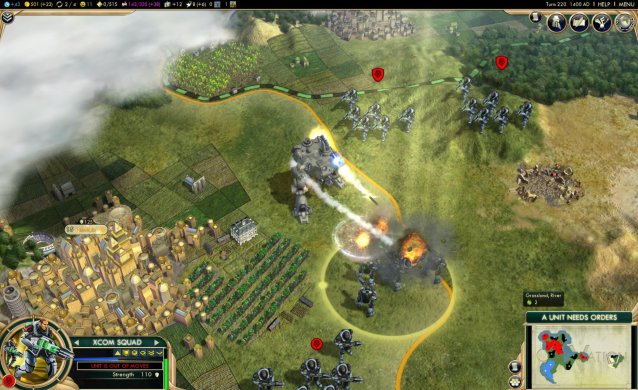
With a steady flow of Culture, you will begin to generate Great People such as Great Artists, Great Writers or even Great Musicians. These Great People will drive your Tourism through constructing Great Works. Think of Tourism as a Culture that influences other civilizations. To achieve a Culture Victory, a player must produce more Tourism than all other civilizations create regular Culture. To increase Tourism, trade routes, open borders and religion will provide bonuses. Great Works create pieces of art or music you put into Culture buildings to produce even more Tourism. Unlike the trade routes, creating Great Works requires players to make tough decision depending on the situation. If a Great Artist spawns, a player must choose if they would rather create a piece of art for the Tourism gain or start a Golden Age for a temporary economy boost.
Outside of their cities, players must also deal with addition of the World Congress. The World Congress brings all the players together to assign their delegates to vote for certain proposals. The first player to meet everyone will become the World Congress leader where they will make a proposal. This proposal ranges from banning luxury resources, imposing trade embargos or assigning the world religion. To obtain delegates, players must build friendly relations with city-states and other players. When voting, you assign your delegate votes for or against proposals depending on what you value. Since each vote counts, players must make a create attempt to ally with city states all over the map rather than those close to them.
The World Congress will either benefit everyone or really hurt one player. Unless a player carries majority amount of delegate votes, proposals should aim to please most people in order to pass. Say if players agree to impose a trade embargo on the game's leader, then the leader's happiness and gold no longer obtained from trades will provide an opportunity for the other players to catch up. Through the use of Spies and friendly relationships with city states, a player can put themselves in a position of power to dictate the pace or difficulty of the game.
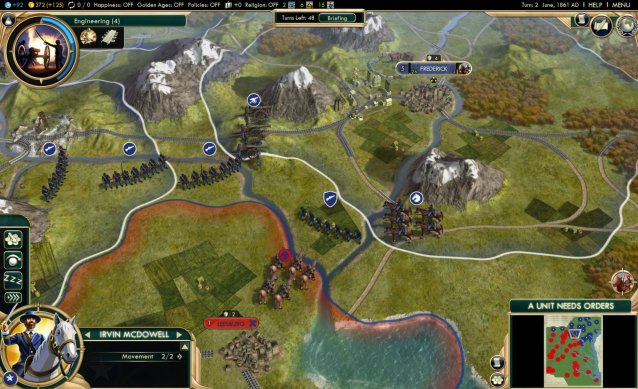
If managed properly, the World Congress can even win you the game without much effort. Brave New World introduces a different branch of Social Policies called Ideologies. Ideologies consist of three different branches in which the player can only adopt one of. Order, Autocracy and Freedom work in conjunction with Tourism and the World Congress to provide shift the beliefs citizens want to follow.
For example, in a five player match, if four civilizations choose Autocracy and the remaining civilization chooses Freedom, that civilization's cities can enter in a rebellion. The population will begin to demand the dominant Ideology (chosen in the World Congress) which can produce unhappiness and revolution in cities following the minority ideology. In one session I played, an opposing city rebelled and just joined my civilization, and came under my control. The dominant Ideologies, no matter how much more useful your Ideology proves to your situation, will force players with minority Ideologies to switch over or face uncontrollable unhappiness.
Previously, Culture Victories came from turtling civilizations no longer relevant in either Literacy or GNP output. Brave New World aims to make a culture victory a viable method outside of the primary military conquest, but Firaxis doesn't quite reach that goal. No matter the situation, war will always produce the best results to winning. If I lead in science, I won't try to achieve a Cultural Victory, I will steam roll the next best civilization who wields inferior units.
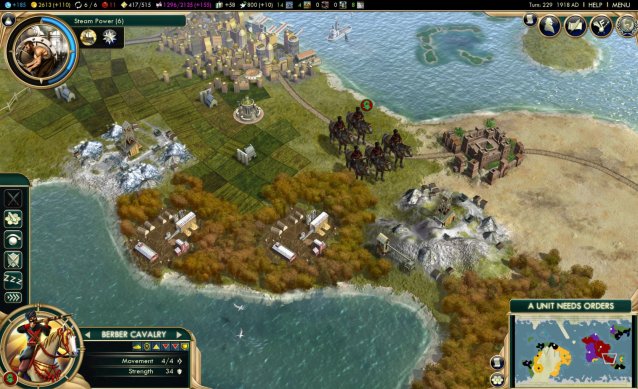
With the science lead, I can also reach certain technologies faster and produce Culture or Tourism wonders first, making the weaker civilizations automatically less threatening for a Culture Victory. Since Culture will drive Social Polices, and foreign Tourism will generate unhappiness, players obviously cannot ignore them. But if I find my civilization suffering from unhappiness because of Foreign Tourism or Ideologies that I don't follow, then I aim to eliminate the source of both those problems.
Civilization 5: Brave New World increases the importance of Culture and Tourism generation, but it doesn't account for the inevitable wars between civilizations. I can discuss how human nature dictates that we will always fight, but I will instead point to the fear of not owning the most cities since most of the time: more cities mean more science. With the best science, you can accomplish most things in Civilization 5.
With Brave New World players will find nine new leaders to build a civilization around. Of the new leaders, Poland's unique unit, build and ability pushes Casimir III into the top tier of civilizations. Most notably, his unique ability, Solidarity, grants a new Social Policy every era. With the additional policies to adopt, Poland quickly becomes a Culture powerhouse who gets even better with the Ducal Stable that grants both production and gold for every pasture.
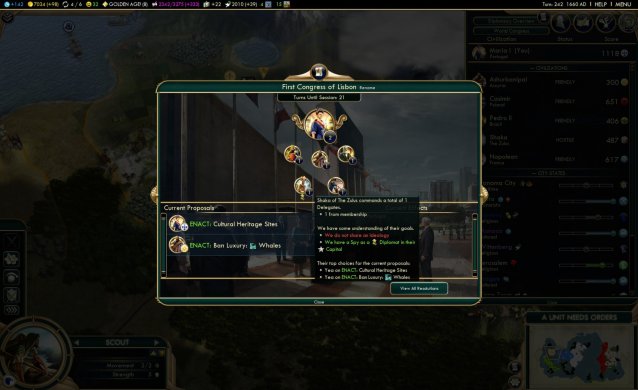
My personal favorite civ, the Shoshone, use their Great Expanse unique ability when settling cities. The ability's immediately larger borders lets you take more parts of the land faster without additional settlers or buying of tiles. Shoshone will easily annoy neighboring players as they watch you swallow up all the land you share with minimal amounts of settlers. The unique scout unit, the Pathfinder, will share the same strength as a warrior and allow the player to choose the benefit of a discovered ruin. The ability proves useful early but becomes irrelevant after players discover every ruin.
Venice also joins the list of newest civilizations but with a much different ability set. Their inability to settle cities with settlers grants them twice the amount of trade routes. To expand, when Great Merchants spawn, you can bring them into city-state borders to puppet the city. With the gold bonus acquired from trade routes, Venice can purchase buildings and units within the city, but nothing else. Firaxis' different approach with Venice ultimately ends up as an interesting experiment that doesn't quite work. Nothing with frustrate a Venice player more than not settling a city on great land next to them. Even worse, stunted expansion because city-states don't appear anywhere near the Venetian capital, limits Venice every more.
Civilization 5: Brave New World helps deliver on the promise to make a Culture victory a viable option through Tourism, yet the power of the World Congress and importance of Social Policies makes Brave New World a worthy expansion. No matter what bonuses Firaxis gives to a Culture and Tourism focused civilization, the path to victory will always prove easiest with military conquest. The way to win in Brave New World lies in a players influence in the World Congress. With majority of delegate votes, you won't vote to your elect your victory, but you will at least make the leader increasingly frustrated with trade embargoes blocking the road to victory.
Civilization 5: Brave New World was developed by Firaxis and published by 2K Games. It was released on July 9th, at the MSRP of $29.99. A copy was purchased by the reviewer for the purposes of review.

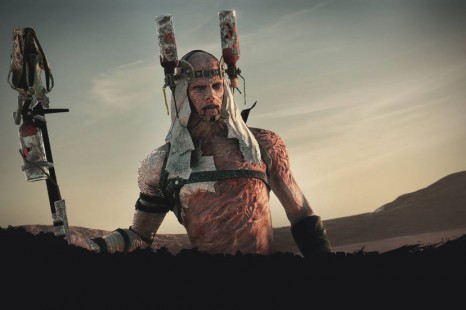
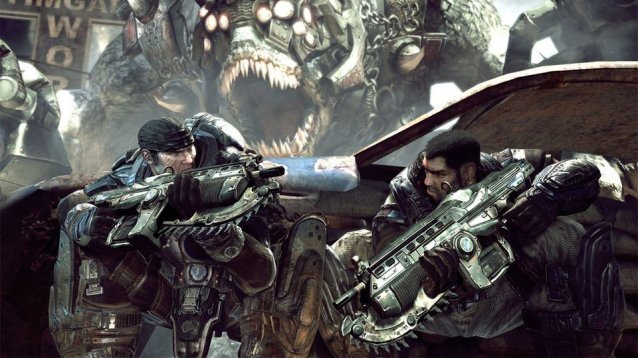

 How to Save Safari Downloads to the Cloud Automatically
How to Save Safari Downloads to the Cloud Automatically Halo 4 vs Halo 3 Screenshot Comparison [Armor/Lighting/BR]
Halo 4 vs Halo 3 Screenshot Comparison [Armor/Lighting/BR] Dark Souls 2 Ashen Mist Heart and Memories of the Ancients
Dark Souls 2 Ashen Mist Heart and Memories of the Ancients DmC Devil May Cry Guide: How to Master Dante's Weapons
DmC Devil May Cry Guide: How to Master Dante's Weapons Inazuma Eleven GO Chrono Stones Thunderflash - Photo Motifs
Inazuma Eleven GO Chrono Stones Thunderflash - Photo Motifs